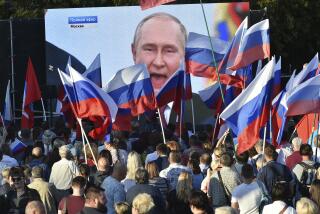For the Last Empire, the Clock Is Ticking
- Share via
In the three years since Mikhail S. Gorbachev and his team took charge, the Soviet Union has experienced a succession of unauthorized demonstrations of increasing size and violence.
First the Crimean Tatars demonstrated for the right to return to their ancestral home from which Josef Stalin had expelled them in World War II. Then the Latvians, Estonians and Lithuanians protested their loss of independence and the flooding of their republics by Russians. In December, 1986, there were violent anti-Russian demonstrations in Kazakhstan. Now the Christian Armenians and Shia Muslim Azeris are locked in a round of ugly pogroms, ostensibly over the administrative status of a territory in the Azerbaijan Republic populated by an Armenian majority but in fact to give vent to grievances that are at least a century old. There have been killings and rapes on an extensive scale.
What does all this portend? The Soviet Union is a multinational empire, made up of a dozen or so major ethnic groups inhabiting their historic homelands and governed from Moscow by a Communist Party apparatus whose leadership is overwhelmingly Russian. For the past 70 years Moscow has pretended that it has solved the nationality problem. But in reality it has only driven it out of sight. Nationalist passions simmer: Most of the minorities would like to be rid of Russian colonial rule; many also have claims against their neighbors.
Gorbachev’s policy of glasnost , or openness, has brought into the open all sorts of discontents that previous communist regimes had managed to silence. When citizens are encouraged frankly to discuss their problems in order to help the government carry out a radical transformation of perestroika , it is hardly surprising that latent ethnic passions quickly rise to the surface. Russian nationalism is more openly advocated than before, and so is the nationalism of the non-Russian groups.
The violent riots that have shaken Armenia and Azerbaijan in recent weeks confront Moscow with a dilemma.
As is well known, the communist regime in the Soviet Union rests not on the consent of the governed but on force--and the conviction, which the recurrent use of this force has managed to instill in the populace, that all resistance to it is futile. A communist regime, therefore, cannot tolerate spontaneous violence of any kind because it betokens weakness and sets in motion a momentum that may cause the state to fall apart. Gorbachev’s conservative opponents undoubtedly relish the recent Armenian-Azerbaijani violence as proof that glasnost and perestroika undermine the communist system’s foundations.
At the same time, if Gorbachev were to suppress these riots by force, as he obviously is able to do, he would deal a serious blow to his entire reform program. Resorting to force to silence expressions of public discontent means going back on glasnost , and encourages those who demand that similar methods be used to cope with all of Soviet Russia’s problems.
Unable to choose between these unpalatable alternatives, Gorbachev has for the time being resorted to persuasion. How effective this tactic will be remains to be seen. But even if persuasion succeeds in quieting curent violence, it will not resolve the underlying cause, which is the colonial nature of the Soviet state. Gorbachev has recently called the nationality question the most serious problem confronting his government. This statement is a welcome, if much belated, recognition of the fact that, as the only remaining empire in the world, the Soviet Union is in this respect, as in many others, an anachronism.
Clearly, sooner or later Moscow will have to acknowledge that in a world in which islands like the Seychelles with 67,000 inhabitants enjoy national sovereignty, the 45 million Ukrainians or 14 million Uzbeks will not remain content to live forever under colonial rule. Perestroika will have to deal with the problem of decentralizing the state structure to give the republics, at the very least, meaningful autonomy and transforming a pseudo-federation into a genuine federal union.
From Moscow’s point of view, the gravest danger is that the ethnic disturbances may spill into Russia proper. The Great Russians, whose political culture is dominated by the legacy of centuries of serfdom, tend to be more docile when subjected to firm authority. But when they perceive that authority to weaken they are likely to explode in uncontrollable anarchy that sweeps all before it.
Time is catching up with communist Russia in many ways. Moscow has eased censorship in deference to the rise of public opinion, and it is about to carry out major reforms to bring the economy into step with that of the industrial democracies. But, quite unexpectedly to itself, it has now been forced to confront a domestic problem that it had believed firmly under control: its imperialism and the spirit of nationalism that it evokes among its victims.
More to Read
Sign up for Essential California
The most important California stories and recommendations in your inbox every morning.
You may occasionally receive promotional content from the Los Angeles Times.










